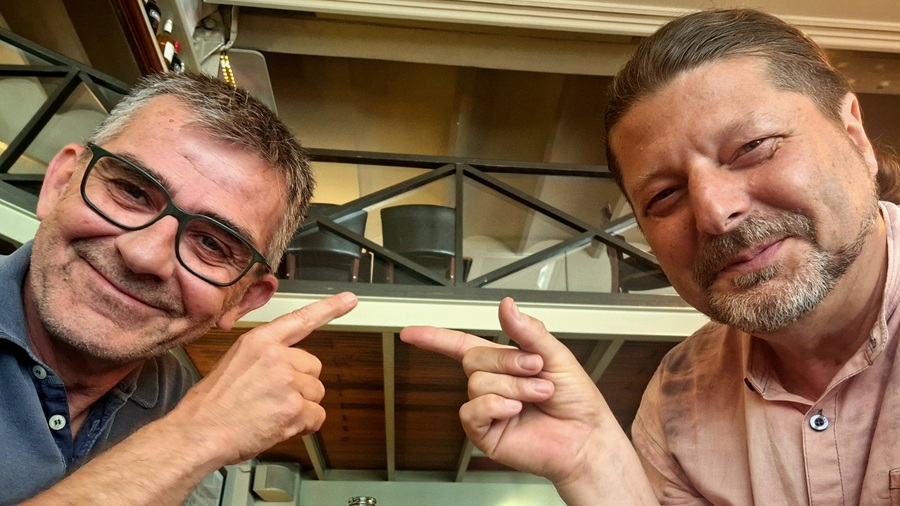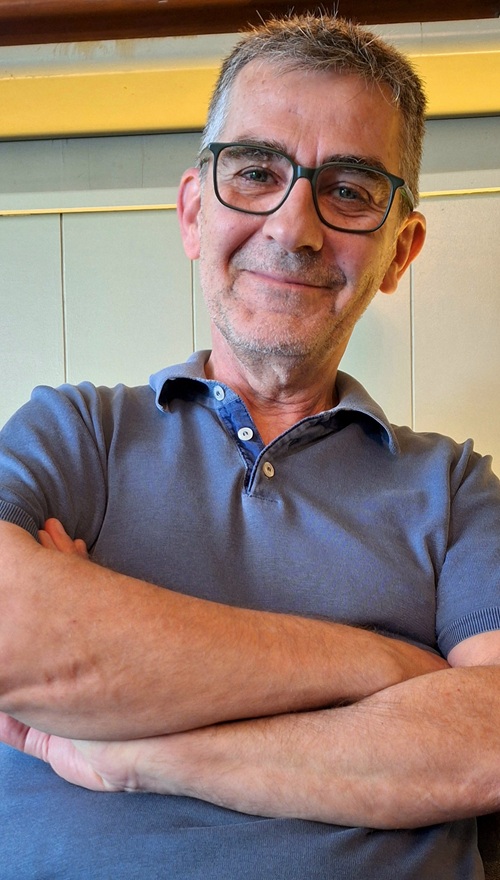- Face to face
- 3 de November de 2025
- No Comment
- 9 minutes read
Queco Novell: “These are tough times for the truth”

Queco Novell (left) with David Rabadà during the interview
FACE TO FACE WITH
Queco Novell, journalist and comedian with a sharp eye
During the teachers’ strike of March 2009 against the LEC, I happened to coincide at RAC1 with this giant of journalism – though many see him merely as a comic impersonator from Catalan public television. Quite the opposite, actually. With his sharp eye and biting humour, this Polònia1 actor dissects reality as if it were a fossil from the present. Queco Novell is, without a doubt, one of the best-known faces of Catalan TV satire.
Born in Barcelona in 1963, Novell started out in the newsroom at TVE Catalunya, but soon evolved—like a species perfectly adapted to its environment—towards the world of comedy and acting. Just watch his brilliant performances in iconic Catalan public TV shows like Polònia. He has brought to life politicians, journalists and other creatures of the Catalan public ecosystem with almost scientific precision. His skill isn’t just technical, it’s anthropological. Watch every gesture, every tone of voice, and you’ll see that he’s telling us something about the person and their time.
With a background in serious journalism, Queco has managed to move effortlessly from the rigour of the newsroom to the mischief of the stage—almost as smoothly as a geologist, like myself, jumping from the ancient Palaeozoic to the recent Cenozoic. Today, Queco’s talent continues to captivate new audiences as he watches, with that cheeky grin of his, the evolution of the society he so deftly imitates. It only made sense for Educational Evidence’s “Face to Face” to bring him here—authentic, unfiltered, and inimitable.
After starting out as a serious journalist, what made you decide to take the leap into satire and comedy?
I guess it was a mix of things. On the one hand, I wasn’t fully enjoying journalism, and on the other, there was my friendship with Toni Soler. He’d go on to become the director of Polònia and other shows. He suggested we do a radio show on RAC1 (Minoria Absoluta), where Manel Lucas and I would talk politics in a laid-back, ironic way. After that came 7 de Notícies, and the rest is history.
Most people know you from your performances on Polònia. Which character has been the hardest to play, and why?
Well, first of all, I don’t really like calling them “impressions”—I see them more as “interpretations”. Some of my colleagues on Polònia didn’t do perfect impressions, but still created brilliant characters. You can nail the voice and gestures and still end up with something flat. Having said that, one of the hardest for me was Joan Laporta, because every time I tried to play him, I kept hearing Maragall in my head—it drove me mad. At one point someone told me, “Forget everything and just dive right in”. And that’s what I did.
“One of the hardest characters for me was Joan Laporta, because every time I tried to play him I kept hearing Maragall in my head—and it drove me mad”
When you portray politicians or public figures, how do you prepare to really capture their essence?
It’s worth saying that Toni, Manel and I all come from political journalism, and when we worked in the field, we had our own sources like any journalist. Sometimes what we joked about in a sketch ended up actually happening weeks later. Sometimes it was just luck, sometimes instinct. A member of a former government once told us it felt like the scriptwriters were hiding under the Executive Council’s table! Without that journalistic background, Polònia would have been a completely different show.
Do you think satire has a greater social impact than traditional journalism?
I’m a strong believer in rigorous journalism that verifies its sources. Unfortunately, such journalism is increasingly dismissed by a portion of the public, who see it as cosy with power. Meanwhile, a form of pseudo-journalism—largely far-right—is thriving, built on lies and fake news. These are difficult times for truth and for serious journalism, which I’d sum up in two points: first, quality journalism is expensive; second, it’s under threat. Satire, of course, can have a significant impact—a show like Polònia certainly does—but to claim it as one’s primary source of information is misleading. Think of Polònia as a valuable complement to the news, not a replacement for it.

Has any of your portrayals ever caused tension or unexpected reactions? Maybe from the Maragalls?
In general, I’ve had good relationships with the people I’ve parodied. You ask about the Maragalls—also good. Pasqual Maragall had a great sense of humour and liked to play along with Polònia. Once, after he became President of the Generalitat, he came up to me in the middle of an event and said, “I suppose you realise it’s not quite the same to imitate the former Mayor of Barcelona as to portray the President of the Generalitat”. I always thought of that as a friendly warning—like a defender talking your ear off all match long, but never actually fouling you. Of all the people I’ve played, only one ever let me know they really didn’t like it.
Who was it? Zapatero? Clos? Rajoy? Felipe VI?
I’d better not say.
What role do you think your education played in your professional success?
That’s something I’ve never really thought about. I don’t really know what to say about that. Honestly, I think it comes more from home than from school. My dad always had the newspaper with him, and I loved leafing through it even when I didn’t understand half of it. Plus, our house was a very political place—Franco’s death and the Transition were intense times. And on the theatrical side, too: a great-uncle was an amateur actor, my dad as well, and my sister Rosa’s a brilliant actress. Politics and theatre were constant topics at the dinner table. I’ve got very fond memories of school, even though I was a terrible student.
Have you ever thought about going back to journalism, or do you feel completely at home in the world of performance?
Going back to journalism? Very, very unlikely. I’m really enjoying what I do now—actually, it’s even better than before.
What does the word “effort” mean to you in your line of work?
Everything. Effort is what keeps everything going—mine, yours, everyone’s. Without effort, there’s no reward.
“Effort is what keeps everything going—mine, yours, everyone’s. Without effort, there’s no reward”
Do you have any future projects outside television—maybe theatre or writing?
Not at the moment. I’m sticking with my regular work on Polònia, Què Està Passant and Cafè d’Idees with Gemma Nierga. I’ve done theatre before and I love it, but I’m not considering it at the moment.
How do you imagine your profession ten years from now, in an increasingly digital world full of AI?
When it comes to AI, I feel a bit like those people who saw the first ever film—with a train coming straight towards the camera—and panicked, thinking it would burst through the screen and run them over. It scares me a little, to be honest. Even more so professionally, because voices are already being cloned without permission. From there to replacing actors—it’s just one small step.
___
1Polònia is a long-running Catalan TV satire that pokes fun at politicians and public figures through sharp sketches and spot-on impersonations.
Source: educational EVIDENCE
Rights: Creative Commons


